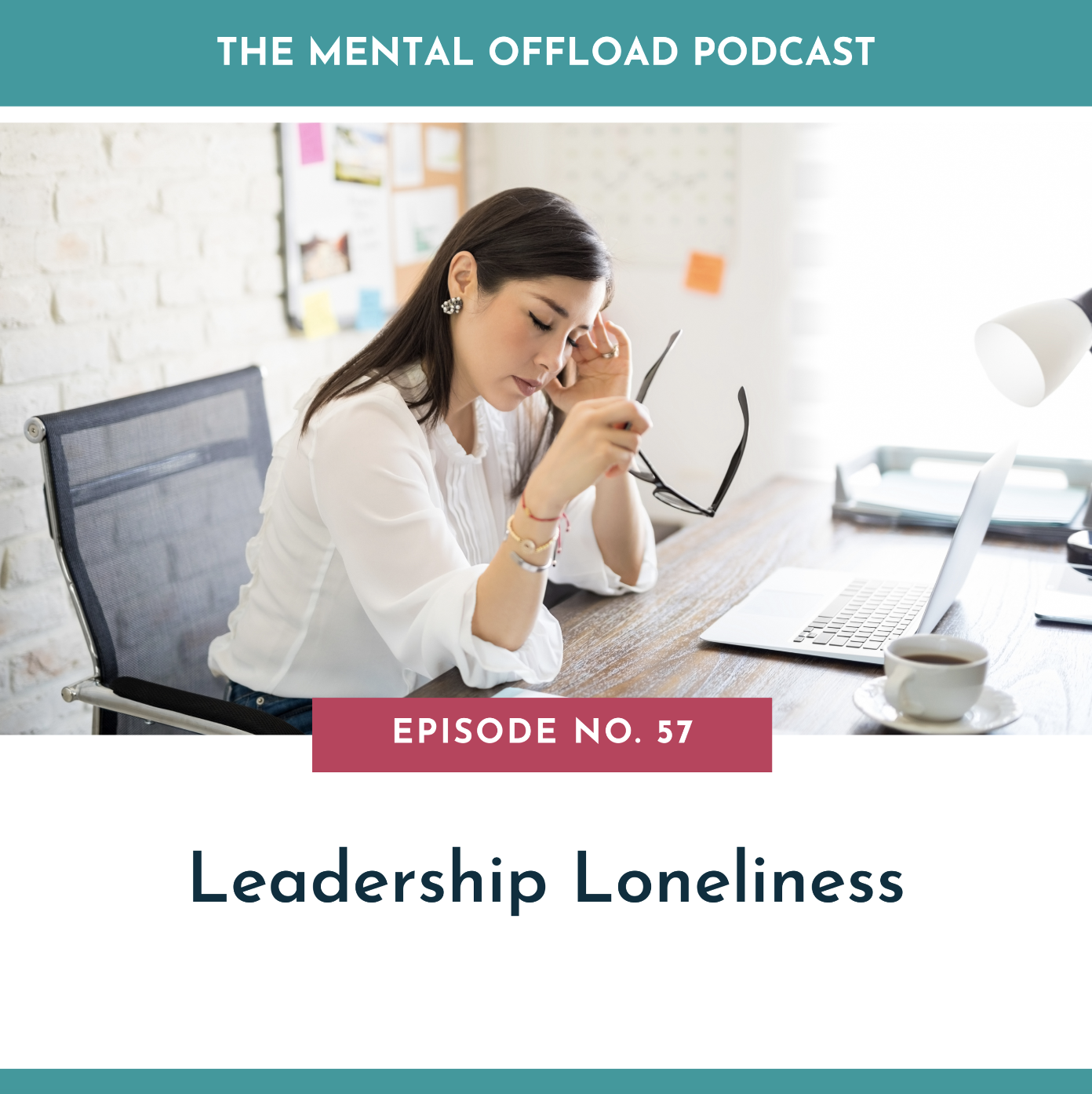Recent Episodes
-
Who Says "Me Time" is Selfish?
April 30, 2024
-
Is Inbox Zero a Waste of TIme?
April 23, 2024
-
Managing Presentation Anxiety
April 16, 2024
-
Decision Constraint
April 9, 2024
-
Sprint Weeks
April 2, 2024
-
Superthinking
March 26, 2024
-
Women Deserve a Mental Offload
March 19, 2024
-
Leadership Loneliness
March 12, 2024
-
Your Future Self
March 5, 2024
-
Executive Presence
February 27, 2024

Women are more aware of the mental load of the household than at any time in the past.
The dynamics of domestic labor and parenting have historically been biased. The expectation: women would and should do the work of running the home and raising children.
Even for women who work outside the home, the mental load often ends up squarely on their shoulders.
- Women put in 10 more hours of household labor than men each week (US data)
And this impacts their careers.
- 57% of women feel that their careers are limited by their caregiving responsibilities at home (US data)
So many women want to rebalance the load at home.
But the advice that permeates so much of the social media sphere is blunt: there are “good guys” (who will willingly step up to the plate at home, if asked) and “garbage guys”. And if you’ve got one of the latter, you’re told your only option is to “throw the whole man away.”
As much as that phrase makes me chuckle, this way of thinking keeps a lot of women right where they started: shouldering an outsize burden at home.
It’s time to unpack our thinking about the mental load at home, and how we can drive more alignment with our partners.
What You'll Learn
- Why the unequal division of labor at home is also an obstacle to women’s career ambitions
- The “good guy” versus “garbage guy” binary thinking that permeates social media, and why more nuance is useful
- 4 partner stances to the mental load, and which ones are “good” or “garbage”
- The two underrated skills that drive more alignment on the mental load at home
Featured in this Episode:
- Fair Play, by Eve Rodsky
- McKinsey/Lean In study, 2022.
- Americans’ Time at Paid, Household, and Childcare Work 1965-2011, Pew Research Center.
- “Gender Differences in Perceived Domestic Task Equity” Young, Wallace and Polachek; Journal of Family Issues, 2015.
- Perceived Equity in the Gender Division of Household Labor, Braun; Journal of Marriage and Family
Listen to the Full Episode:
Full Episode Transcript:
Episode 65
In a world where the mental load weighs heavily on women, what's up with male partners? Is there a magic trick to get them to take on more of the mental load at home? If you're in a heterosexual partnership or know someone who is, this episode is a must listen. We'll unpack the dynamics of household labor, some common troops, about men in the domestic sphere, and we'll look at both the skills and the mindset that you can bring to get more traction on sharing the mental load at home.
Welcome to the Mental Offload podcast where we talk about women balancing work and life. It's the podcast that combines leadership, feminism and coaching tools so you can tackle it all with more confidence and less stress. Here's your host Ivy League NBA certified feminist coach and corporate warrior, Shawna Samuel.
There's that old saying behind every successful man is a woman, and in an era where wealthy white married women were largely excluded from the paid workforce, this was literally true. But there's another layer to this that's true even today, I think career success does require a team at home. And so who is part of that team for women? For many women, the answer is, well, no one. So today, offloaders, I want to talk about the mental load at home and negotiating to get to a more equal division of Labor. Now, before I really get into the meat of this episode, because we're we're going to cover a couple things here that are really important around how domestic labor is distributed, some of those dynamics and some of the social media advice that seems to permeate the sphere. But I want to acknowledge just going into this episode that this is a really meaty topic and I could probably record about 5 hours worth of content just on today's topic alone. So I'm going to keep this pretty streamlined. And rather than trying to go super broad today, we're going to go a little bit narrow and deep. But look, even if you're not wondering, well, how do I really approach my partner to get traction on the mental load and sharing that, I know that there's going to be some really good takeaways in this episode for you around how we approach relationships overall.
So even if you're thinking, oh, this topic might be a bit narrow for me, I want you to listen in and think about where you can apply some of this stuff in your own relationships, either at home or at work because we will touch on how this stuff carries over. But with that preamble, let's dive in, starting with the mental load and how it's divided up at home. Now the statistics around this are pretty dismal. There is not in most households an equal division of Labor at home, and no surprise, it tends to fall more heavily on women and people assigned female at birth. Looking at data from the US, and as usual, I'll link all of this data in the show notes, women are performing 10 hours of additional household labor every week in the home. Now, just to be clear, most of the statistics that I'm going to cite today are drawn from U.S. data and they're drawn from heterosexual relationships because in heterosexual relationships, statistically, men do less of the household labor, less of the child care, and there tends to be a more unequal split of Labor. This imbalance is generally not present or greatly reduced in same sex relationships. I'll get back to why that is a little later in this episode.
But this imbalance, that 10 extra hours, you know, more than an hour a day on average that women are putting in household labor above and beyond their partners, This leaves women carrying more of the mental and emotional load of the household and parenting. Now, that's already an unfair split right there, and it would be bad enough if it were just confined to this area. But The thing is, this imbalance, it also impacts women's careers. There was some survey done that suggests that 57% of women, almost 2/3 of women, feel that their careers are limited by their caregiving responsibilities at home. So the unequal division of Labor at home has the spillover effects into our professional lives. My conviction here at The Mental Offload is this. The unequal mental load of parenting is one of the biggest obstacles that gets in the way of women's success in the workplace. Because if we're too occupied, too drained with all the household stuff, we simply don't have the mental bandwidth or the energy to invest in our careers. So the weight of the mental load, it has real effects on our lives at home and it has these spillover effects across every part of our lives, reducing our bandwidth, reducing our stamina to invest in outside pursuits. And even if it didn't have that impact on our bandwidth and stamina, it's simply unfair. We shouldn't have one part of a so-called equal partnership doing proportionally more of the stuff. And I think loads of women get it. They see it.
We have now a real cultural conversation around the mental load and its impact, and I see more and more interest in women wanting and trying to move their relationships in a more equal direction at home. And there's been a lot of great work around this. I'm big fan and supporter of folks like Eve Rodsky at Fairplay, not just her book, but the Fair Play Institute, doing a lot of great work in this space. But what I've noticed in talking to a lot of women and being part of many groups who have conversations around the mental load is that a lot of times the efforts that we're making as individuals within our households aren't working right. They're met with resistance, intransigence, flat out weaponized incompetence. If you aren't familiar with the term weaponized incompetence, this is really just a term in the sociological sphere to refer to this technique that some people use to try to get out of responsibilities at home. They just do the thing so badly that hopefully you never asked them to do it again. You know, like they put all the Reds and all the whites in one load in the laundry so that everything comes out pink.
And hopefully when they do that enough times, you're just like, oh, can't, they can't do laundry. I got to stop asking. Right? So that's weaponized incompetence, really. Deliberately doing tasks at home badly so that you do not get asked to do them again. So we know that some of the attempts to get partners on board are met with resistance, are met sometimes with weaponized incompetence. And I've noticed something curious in a number of forms where this kind of stuff gets discussed. And it seems to be starting to permeate social media, this advice that if your spouse or partner doesn't step up or doesn't get it when it comes to the mental load, you should just leave. There's this phrase that gets thrown out a lot that's like, just throw the whole man away. I always get to chuckle out of that phrase because I, I do think it's, it's humorous, but it comes from a very serious sentiment. Just leave is the option that women are provided if they're not getting attraction and help at home. So I chuckle, but it is really meant as serious advice in many of these cases. And I want to be really clear as I talk about this, leaving someone is always an option in my work. I'm very clear you do not need any reason to leave a partner, let alone a good reason. You know, you can just decide you're done. That is totally fine. You can always walk. And I'd never counsel you to stay in a relationship that has gone sour for you. But I'm talking about this here because many of the women that I work with and speak to don't want to leave their relationships. They're largely pretty good on a number of areas. But this is a sticky issue and this sort of mentality of, well, he's either a good guy or he's a garbage guy. That leaves a lot of women feeling stuck.
Like either you win the lottery and you got a good one, or you're stuck with the garbage man and either way there's nothing you can do as the partner. This feels super shitty because it leaves you stuck and it leaves you powerless. You're stuck in a binary way of thinking of he's either good or he's garbage, and you're stuck in total powerlessness because there's really nothing that you can do to change the situation. You just have to either accept the status quo or hope he wakes up to the reality of the mental load or leave. And these all seem like pretty shitty options. Now again, I'm going to be a little bit careful here because let's not get too rosy eyed either. You can't force a partner to change, right? And too often women have been asked to see their partners as some kind of fixer upper improvement project to you can change and and mold over time. That way of thinking is not helpful either. So I'm not encouraging you to go into that space, but I do want to show you where you have agency, where you have power and influence before concluding that you need to throw the whole man away. And I trust that we can have a really nuanced discussion about this topic here because I know I've got really smart listeners who think about these issues quite deeply. So when we're in this kind of good guy or garbage guy binary way of thinking, it really leaves us, like I said, with very few options. Number one, you can accept the status quo. And too often, in fact, probably almost all of the time, this means piling up a pound of resentments because you're continuing to carry the vast bulk of the burden at home and feel like you just have to do that, you know? So it builds up all these resentments until typically it gets to a point where you either explode or decide that their relationship is no longer worth investing in, right? And then you go to the other option of like, guess I just have to leave. Got a garbage guy, I need to leave.
The second option is hoping that he wakes up to the reality of the mental load. And what usually I see happening in this option is that you're going to try to accelerate his education about the mental load. So it usually results in pushing a bunch of articles at your spouse to try to educate them or really explaining the mental load through, let's face it, probably gritted teeth until you're just thoroughly exasperated. And again, if this technique is not working, resentment and exasperation and anger build up to the point where that third option to throw away the relationship becomes the most appealing option. And if you see yourself a little bit in some of these descriptions, I want to just pause and say there is no shame in that. We aren't given a lot of models. We aren't given a lot of education or information on any alternatives. If all that's out there is really this sort of you've got a good man or a garbage man mentality, it's no wonder that so many women are stuck feeling like these are the only options and not really seeing a clear route forward. So I'm going to offer you a different way of seeing this. Instead of seeing it as a binary, see it as more of a spectrum. At one end of the spectrum, you do have the good guys, the allies. These are the partners who are quick to get on board with a fair and equitable split at home. They get it and they step up. They sometimes need to be asked, but they generally do step up. And at the other end of the spectrum, you do have the metaphorical garbage. I don't really like that term for talking about human beings. In my work, I use the term hostile, the hostile end of the spectrum. These are people who, generally speaking, are really entrenched in outdated binary gender roles for the household. They believe that they are entitled to remain completely unbothered by the domestic labor and they have absolutely 0 intention of taking it on. You could send the hostile guy 1000 articles about how Bill Gates dropped his kids off at preschool while he was CEO of Microsoft and they'd be like, wow, he got a bum deal. What a loser, right? Like hostile individuals. And these types of individuals do exist, people who are in that hostile stance. But most people fall in between these extremes on the spectrum. They're neither allies nor are they fully hostile. If you came to some of my master classes last year, you've heard me talk about the four stances of male partners around the mental load.
And one of these is the clueless stance. People who are in the clueless area of the spectrum, they tend to not notice stuff that needs to be done. They'll say things like, why didn't you just ask for help? Or I didn't even see that that was an issue. And in between the clueless and the outright hostile area of the spectrum, we have the resistant stance. These are people who tend to get quite impatient or dismissive when discussions of the mental load are brought up. Or sometimes they will tend to say the right things, but their actions completely do not line up. Like they'll say the right things to kind of make the discussion go away and then not do the work. A lot of times they're OK with their male privilege. They just don't want to be seen as a complete a hole. So when you're dealing with someone who's in one of these middle parts of the spectrum, you know, the clueless types or the resistant stance, there is no amount of articles or attempts to educate or enlighten or collaboratively work with them that is really going to get you traction. I read an article suggesting that you know, a great way to divide up the mental load is to just, you know, sit down with a legal pad and divvy up chores with your spouse. Now, this approach will work great if your spouse has more of an ally stance, but it's going to be an epic fail at other points on the spectrum, who might get some downright resistance and outrage and intransigence. At best, you might get some initial agreement, and then what happens? They'll drag their feed or they'll do it badly.
They'll really undermine your attempts to get them to do more right? And So what ends up happening is that we conclude that this is impossible. Like this is garbage guy. It's not going to be possible to get them to make any move. And we start to give up. And what I want to offer you is that my philosophy on this is that part of the time it is going to be an issue with a human who is not willing to move. They're in the hostile end of the spectrum. But a lot of the time, it's just that we're not using a technique that is going to be useful in getting traction and moving our partner right. We tend to default to the techniques that we are most comfortable with. And for women, these tend to be techniques like collaborating, educating, subtle suggesting and hinting. And these techniques simply do not work well when we're dealing with people in the middle of that spectrum and that like clueless or resistant areas. What's usually needed is not to throw the whole man away. It's just different techniques. So the two techniques that tend to work best in the middle of the spectrum, if you're dealing with someone who's showing signs of cluelessness or signs of resistance are negotiation and influence. Now, when I work with clients on this stuff, we start by really diagnosing the partner stances and then I recommend the appropriate techniques that work best for a given stance. And we have a chance to really. Practice them and get comfortable with them because most of us are not trained in and not comfortable with negotiating off the bat. I was trained in negotiation in Business School and even after going through coursework on this, that was really just the start of getting comfortable with it. So I'm not going to have time to take you through a full course in negotiation today. What I want to do, though, is help prepare you for negotiations and asserting your influence at home. My #1 tip, the place to absolutely start on this is to prepare for resistance, right? Because a lot of times we assume that our spouse should just get on board, right?
We should just be able to tell them, hey, I need you to do these three things or I need you to take on responsibility for getting the kids ready and fed in the morning so that I just have to drive them to daycare, right? And then we're surprised when we receive resistance. So instead of assuming that your spouse should be on board right away, what have you just prepared for them to show some resistance like a toddler? Toddlers want to play all the time, right? And then when it's time for bath time, whoa, massive resistance. Like, even if they like bath time, this is the case for both of my kids. They loved bath time once they were solidly there. But that moment where you're asking them to actually go and get in the bath, they act like they're being sent to prison, right? It's high drama. And here's the thing. Lots of psychological research has showed that resistance is a very normal human reaction. Any time we perceive that we're losing something. It's called loss aversion for that reason. Losing play time? Horrible. This is major cause for a meltdown. As parents, we know we'll encounter resistance and we prepare for it. But when a spouse or a partner puts up resistance, we're often unprepared. And sometimes we're not just unprepared and surprised, we're indignant. We think that they should just get on board already. But if you prepare for that loss aversion, if you prepare for some resistance, you can do that with a lot of love. Like, I know, I know, honey, I hate changing my schedule for sick days too. It's stressful, it's chaotic, it's a royal pain in the ass, especially, I know, when you've got important meetings. I know you don't want to do it. I totally get it and I don't want to do it either. But I trust that we can figure out a, a really fair solution, right? So you can come at it from a place of expecting that resistance and continuing to move through the conversation. If you can negotiate with a toddler, you can negotiate the mental load. And I think that's an important mindset to bring into negotiation. We can't talk about negotiation without talking about mindset because again, because of the way that we are socialized, most women are less confident and negotiating and influencing then we are at collaborating, at educating, at giving subtle hints and hoping someone will get on board. Most of us are simply not trained on how to engage, how to negotiate through resistance. So when we face it, we get really riled up or we shut down and we withdraw.
So we're going to talk for a moment about negotiation mindset because the mindset you bring to your negotiations will come through. It will either show up as you shutting down and withdrawing or getting really riled up and angry and blowing up, or a great mindset will help you engage productively. So if you're listening to this episode and you're thinking I shouldn't have to negotiate this, you should just get on board. Or you're like, negotiation? Is she talking confrontation? I don't like confrontation. Or some of us are trained to think of negotiation as like, well, OK, then I guess I need to be making some kind of trade. Like if he does all this stuff around the house, then I'm going to be obligated to give him more time doing golf or away from the house. No, this is not negotiation. That is bartering. So your mindset around negotiation, it doesn't only impact how you negotiate at home. This impacts how you negotiate and show up at work too, right? So if we think of negotiation as bartering, for example, my guess is that this is how you show up at work when you have to try to negotiate for more resources for your team, like little horse trading, OK, if I get more money for this one, then I'll give you more resources for that other project, right? Our mindset around negotiation not only impacted by our training, but by our socialization. We're socialized to believe that women should take on more responsibility at home, and we're socialized to believe that negotiation is confrontation, or it's unseemly, or it's aggressive, or to be likeable. In a negotiation, I have to barter. I have to do some horse trading. It's not something that nice women are supposed to engage in. So no wonder we're not comfortable with it. No wonder we back away from developing our skills in this area, from even attempting to assert ourselves in some of these ways. And I really think that we need to cultivate a new mindset around negotiation in so many cultures. My mindset around negotiation, what you're welcome to borrow, is everything is a negotiation. And I do invite you to borrow it because it really normalizes. Negotiation is part of your day as part of your life, and it's a great skill to have in your toolbox as you navigate both personal and work relationships. As a side note, I didn't really embrace that mindset until I moved to France, where the default response to most requests is no.
If you've ever encountered A Parisian waiter, you're familiar with this dynamic. So in France, it's really normalized to just negotiate. You don't get anything without negotiating. So I've come to see it as normal as a daily practice. And I think when we do that, it reduces some of the discomfort around going into a negotiation. So I want you to just take a moment and think about what mindset you bring, what beliefs and attitudes you bring to negotiating and influencing at home. Because in the majority of cases, it's not necessarily a skills deficit that's going to trip you up, right? Like you can negotiate with a toddler and you're probably doing it every day. What tends to be the stumbling block. And the very first thing that I want you to address is the beliefs and attitudes that you bring around negotiation because that influence how comfortable you are staying in an uncomfortable conversation. So really take a moment to think about the mindset and attitude that you want to have around negotiation and prepare for that initial resistance. Be willing to talk through and move through it. And if you do nothing else but those two things, you already be much more successful in your negotiations at home and at work. And again, this is so critical for success. Unburdening ourselves at home is a major obstacle to the success of women in the workplace and in our lives overall. And yet, getting stuck in that binary way of thinking that you're either dealing with a good man or a garbage man, this may not be a helpful way for us to move forward. We've spent a little time on a pretty meaty and nuanced topic today, and I want you to have three main takeaways #1 there is a spectrum of behaviors. There's more than good men and garbage men. A lot of people fall into the middle of that spectrum #2 being able to bring influence and negotiation as skills to people in the middle of that spectrum is what's going to allow you to make a lot more traction and gain equal footing at home. And #3 one of the biggest obstacles to being able to apply those skills at home and in any domain is our own level of comfort. That starts with mindset. That starts with investing in our skill set in these domains. So try the tips from this episode and start embracing doing some daily negotiation. As we strive for gender equality in all facets of life, let's keep in mind that reshaping household dynamics, it is about fairness. Yes, and it's bigger than that. Achieving equality at home is essential to unlocking women's full potential in the workplace in the world. So let's embrace negotiating for more of what we need in all spheres.
Are you ready to step into a life for Success at work and success at home go hand in hand and it's time for the mental offloads shutdown ritual. It's a proven, practical method to help you log off and leave work behind you tan on your evenings and be present with the people you love. And the shutdown ritual makes it easy gain the power to truly walk away from work and be present with the people who matter the most to you. It's just what you need if you want to achieve big things in the world without losing your mind. Ready to reclaim your time and your Peace of Mind? Go to www.thementaloffload.com/shutdown and get your free download of the Shutdown ritual. That's www.thementaloffload.com/shutdown. And join me next week for the next episode of the Mental Offload Podcast.
Share this post on:









